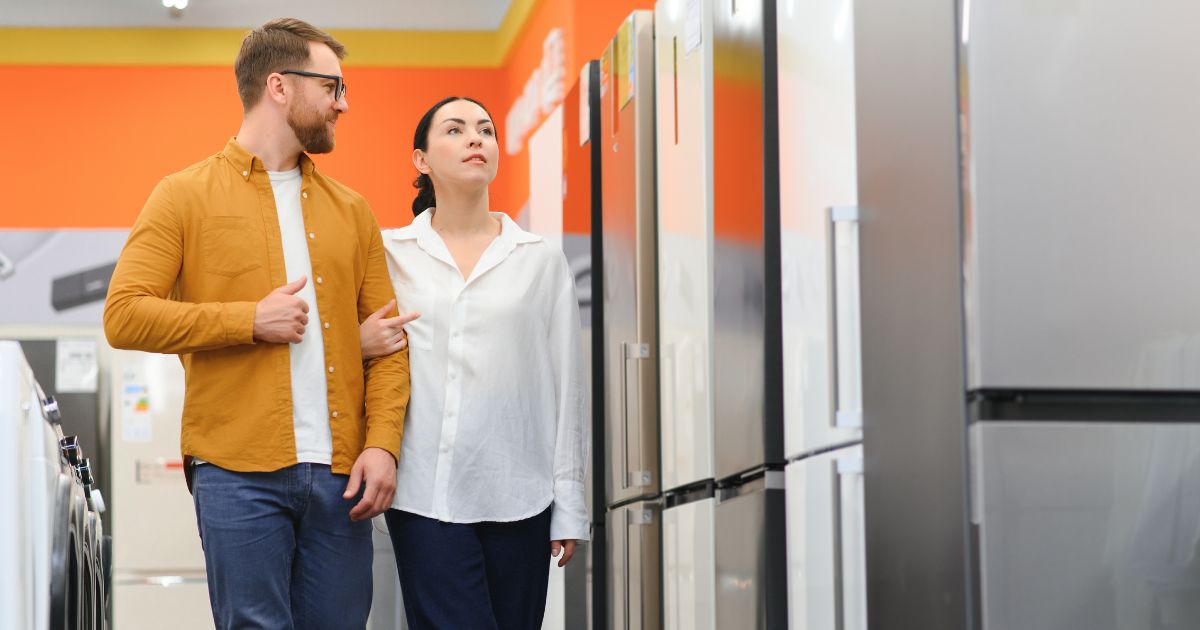Deciding between inverter vs non-inverter ACs can be a tricky choice. Inverter ACs are known for their energy efficiency and quieter operation, while non-inverter ACs are appreciated for their simplicity and lower initial cost. But which one is perfect for you? In this guide, we’ll break down the key differences, benefits, and drawbacks to simplify the decision-making process. Discover which AC type best meets your needs and budget for optimal comfort.
Understanding Inverter ACs

What is an Inverter AC?
Inverter ACs are advanced cooling systems that use innovative technology to regulate the speed of the compressor motor. They operate on a fixed cycle of turning on and off to maintain the desired temperature and provide a more consistent and energy-efficient cooling experience. Also, they deliver more efficient and precise cooling, enhancing comfort while being more environmentally friendly and cost-effective.
How Inverter ACs Work?
Inverter ACs feature a variable-speed compressor that adjusts its speed according to the room’s cooling needs. This continuous adjustment allows the AC to maintain a stable temperature without the frequent start-stop cycles seen in non-inverter models.
Inverter AC Advantages and Disadvantages:
| Pros | Cons |
| Energy efficient | Higher upfront cost |
| Quieter operation | Maintenance complexity |
| Environmentally friendly | Setup requires skilled technicians |
| Longer lifespan | Replacement parts may be costlier |
| Rapid cooling and heating | Complex technology |
| Reduced wear and tear | Requires consistent power supply |
Best Picks:
- Voltas 1.5 Ton 5 Star Inverter Window AC
- Panasonic 1.5 Ton 5 Star Wi-Fi Inverter Smart Split AC
- Lloyd 1.5 Ton 3 Star Heavy Duty Inverter Split AC
- Godrej 1.5 Ton 3 Star Window AC
- Blue Star 1.5 Ton 3 Star Inverter Split AC
Understanding Non-Inverter ACs

What is a Non-Inverter AC?
Non-inverter ACs are traditional air conditioners that operate at a fixed speed. They use simpler and more traditional cooling technology and feature a fixed-speed compressor that turns on and off to maintain the desired room temperature. These ACs have a simple operation mechanism and are often easier to maintain compared to inverter ACs. However, on-off cycling can lead to less energy efficiency, more noise, and less consistent temperature control.
How Non-Inverter ACs Work?
Non-inverter ACs have a fixed-speed compressor that either runs at full capacity or shuts off entirely when the room reaches the set temperature. As the temperature rises, the compressor turns back on, and this cycle repeats.
Non-Inverter AC Advantages and Disadvantages:
| Pros | Cons |
| Lower initial cost | Less energy efficient |
| Simpler technology | Noisier operation |
| Easier and cheaper to repair | Temperature fluctuations |
| Suitable for occasional use | Higher electricity bills |
| No need for a consistent power supply | More frequent wear and tear |
| Simpler interface | Less environmentally friendly |
Best Picks:
- Daikin 0.8 Ton 3 Star Fixed Speed Split AC
- Blue Star 1.5 Ton 2 Star Fixed Speed Split AC
- Lloyd 1.5 Ton 3 Star Fixed Speed Window AC
- Hitachi 1.5 Ton 3 Star Fixed Speed Split AC
- Blue Star 1.5 Ton 3 Star Fixed Speed Window AC
Comparative Analysis: Inverter ACs vs Non-Inverter ACs
Energy Efficiency
Inverter ACs—Inverter ACs are designed to be highly energy-efficient. They continuously adjust the compressor speed to match the cooling requirements, resulting in lower electricity consumption and reduced energy bills. They also avoid the energy spikes associated with turning the compressor on and off.
Non-Inverter ACs—Non-inverter ACs are less efficient as they operate at a fixed speed, constantly turning the compressor on and off. They use a start-stop cycle to maintain the desired temperature, which leads to higher energy consumption and increased electricity bills. Overall, non-inverter ACs consume more power to achieve the same cooling effect, resulting in higher energy bills.
Also Read: To know about the best inverter AC in India, go through our top picks. We’ve listed smart, energy-efficient models that offer maximum cooling to help you stay comfortable all summer long.
Noise Levels
Inverter ACs—Such ACs operate more quietly because they avoid the abrupt start-stop cycles of the compressor. The continuous operation at variable speeds reduces noise and leads to smoother operation. This makes inverter ACs a preferred choice for those who value quieter indoor environments, especially during sleep or work.
Non-Inverter ACs—These ACs are typically louder due to the compressor’s frequent on-off cycles. The sudden starting and stopping can generate noticeable noise, which might be disruptive in quiet environments, particularly in quiet environments. While noise levels can vary between different models, non-inverter ACs generally exhibit higher noise levels.
Cost
Inverter ACs—Generally, inverter ACs have a higher initial cost due to advanced technology and features. Also, its maintenance is a bit expensive with high-priced components. However, the long-term savings on electricity bills can offset the higher purchase price.
Non-Inverter ACs—Such ACs are typically less expensive, which makes them an attractive option for those on a budget. Despite higher operational costs due to less efficiency, the lower initial investment can be appealing.
Also Read: If you’re on a budget, here are the Best ACs under 30000. These ACs promise efficiency, innovation, and value for money.
Temperature Control
Inverter ACs—Such ACs excel at maintaining a more stable and precise room temperature. The continuous adjustment of the compressor speed allows inverter models to adapt more efficiently to changing cooling demands without significant fluctuations, resulting in a consistent and comfortable indoor environment. This is one of the major differences between inverter and non-inverter split AC.
Non-Inverter ACs—Non-inverter ACs have a compressor that either runs at full speed or is off, resulting in temperature fluctuations. This on-off cycling causes noticeable variations in room temperature, with the room feeling too cold when the compressor is running and too warm during idle periods. As a result, non-inverter ACs may provide less consistent temperature control compared to inverter models.
Environmental Impact
Inverter ACs—Inverter ACs use eco-friendly refrigerants and have a lower carbon footprint due to their energy-efficient operation, making them a more environmentally responsible choice. They help reduce electricity consumption, resulting in lower carbon emissions and a smaller ecological footprint. Such ACs mitigate the environmental impact associated with air conditioning.
Non-Inverter ACs—Non-inverter ACs tend to be less eco-friendly. They have a higher environmental impact compared to the inverter model as they use older refrigerants, which contributes to a larger carbon footprint. Also, they result in increased greenhouse gas emissions and greater strain on energy resources. However, due to their cost-effectiveness, they are still widely used.
Difference Between Inverter and Non-Inverter AC

Which One to Choose: Inverter vs Non-Inverter ACs?
Here’s a guide to help you make the right choice between inverter vs non-inverter ACs based on different scenarios:
- Small Apartments: If you want to install an AC in a smaller space, an inverter AC is ideal due to its efficiency and quiet operation.
- Large Homes: Inverter ACs are also suitable for larger homes where multiple units may be running simultaneously. They offer significant energy savings and help reduce electricity bills.
- Office Spaces: Inverter ACs are essential for office environments where noise levels and consistent temperature control are important. They ensure a peaceful environment.
- Occasional Use: If the AC will be used infrequently or in a less critical area, a non-inverter AC can be a cost-effective solution. They are budget-friendly and offer a great cooling experience.
- Frequent Use: If you plan to use an air conditioner regularly, you should buy an inverter AC, as they are more durable and can withstand regular wear and tear.
- Have Budget Constraint: If you’re looking for an air conditioner on a budget, you must choose non-inverter ACs. They have low upfront costs and require less maintenance.
Final Words
In summary, choosing between inverter air conditioners vs non-inverter air conditioners depends on your specific requirements. If you prioritise energy efficiency, quieter operation, and precise temperature control, you must choose an inverter AC. However, if your budget is lower and you need a simpler, cost-effective solution for occasional use, a non-inverter AC is a suitable choice. Evaluate your priorities and select the AC that best fits your lifestyle and preferences.
FAQs
What is the difference between inverter and non-inverter AC?
Inverter ACs have a variable-speed compressor that adjusts its speed, offering better energy efficiency and precise temperature control. Non-inverter ACs have a fixed-speed compressor that turns on and off to maintain temperature, resulting in higher energy consumption.
Is non-inverter AC better than inverter AC?
Both inverter and non-inverter air conditioners come with their own set of advantages and disadvantages. Non-inverter ACs are generally less energy-efficient and noisier but have a lower initial cost and simpler technology. Inverter ACs, on the other hand, are more expensive but offer better energy savings, quieter operation, and more consistent temperature control.
Does non-inverter AC need a stabiliser?
Yes, non-inverter ACs typically require a stabiliser to protect against voltage fluctuations, as their fixed-speed compressors are more susceptible to damage from an unstable power supply.
Is non-inverter AC good for the home?
Non-inverter ACs can be suitable for homes with a lower budget and where energy efficiency is not a primary concern. They are effective for cooling but may result in higher electricity bills.
How does non-inverter AC work?
Non-inverter ACs work by using a fixed-speed compressor that turns on and off to maintain the set temperature. When the room reaches the desired temperature, the compressor shuts off, and it restarts when the temperature rises. This cycle keeps repeating.




